
Nordling here.
First, sorry this final installment took so long. I could give all sorts of reasons - life stuff, movie stuff, work stuff, but the fact is when I started this article I found myself thrown into a huge case of writer's block. How in the hell can I write about ALIEN, one of my legitimate top ten films of all time? I really felt (and still think) that I'd be doing this movie a great disservice just by attempting it. In the end, I just armored up and dove into it. If you've been reading this series so far and enjoying it, thank you and I appreciate you sticking through with me with it.
Since the release of PROMETHEUS, ALIEN has changed somewhat, especially with Ridley Scott's new ideas for the universe he helped create. I do go into the new stuff a little bit, but in the end, ALIEN is its own thing, and I think it's unfair to both PROMETHEUS and ALIEN to go into much detail about it. ALIEN stands on its own without PROMETHEUS to back it up, and I think you can take or leave PROMETHEUS when watching ALIEN. I definitely wanted to avoid going into the ideas of PROMETHEUS and how it affects ALIEN because ALIEN, when all is said and done, really is a different movie - different in intention, and different in the end result.
Although it may not seem so, the science fiction/horror hybrid is fairly difficult to pull off successfully. There’s a fine line that has to be walked – overplay the horror, and the larger ideas of science fiction get shoved to the wayside; overplay the sci-fi, and the movie simply ceases to be scary. It would seem to be a chocolate/peanut butter mix but it’s actually quite rare when it works. Movies like THE THING (both versions) or THE QUATERMASS EXPERIMENT manage to make it work, but for the most part, movies that try end up being SyFy fodder.
ALIEN is rare for that aspect alone – both the science fiction and the horror work equally well. ALIEN has a lot of ideas, some of them larger than would seem to work in what is ostensibly a monster movie, but it carries them off perfectly. And as a horror movie, ALIEN is one of the scariest ever made – its sexual imagery, coupled with its full-on embrace of some of the best gore imaginable, and what many consider to be the greatest movie monster of all time, make the movie relentless in its ability to frighten audiences the world over, many times over. ALIEN balances the wonder and the terror in ways that most other movies don’t even dare to try.
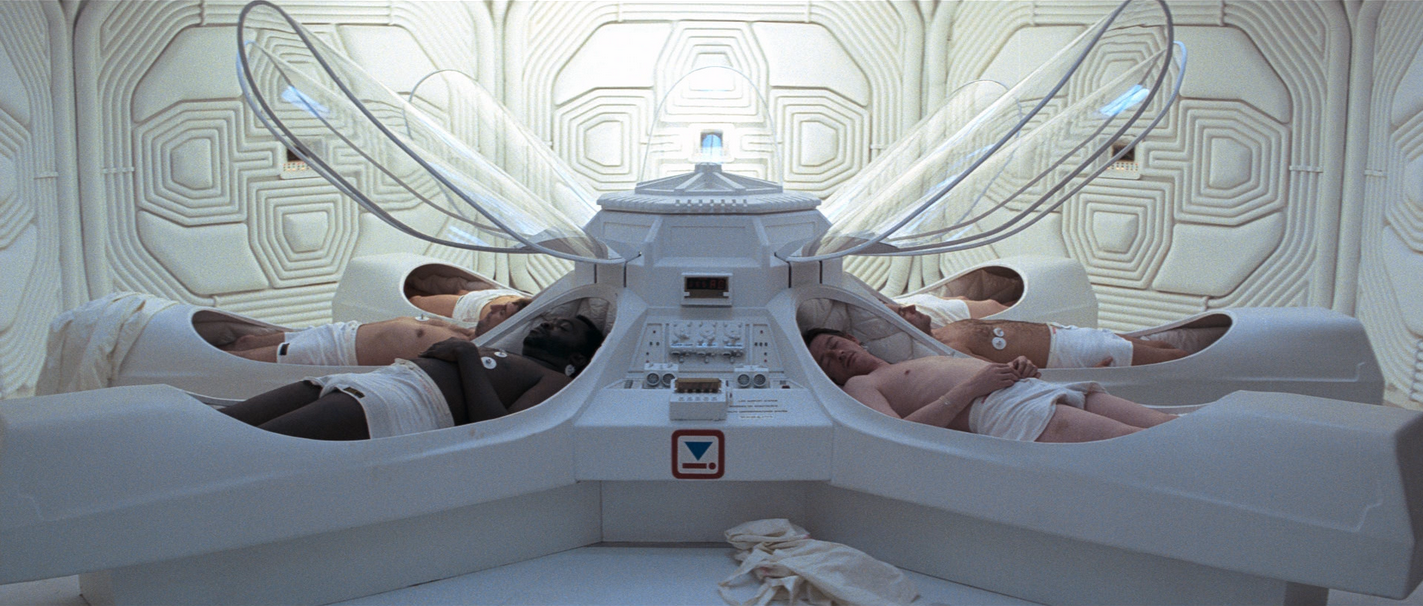
ALIEN was released in May of 1979; three months later Francis Ford Coppola’s APOCALYPSE NOW, after many months of post-production, was theatrically released in August, and 1941, Steven Spielberg’s comedy about the days after Pearl Harbor, was released in December. Through these three films one could chart the death of 1970s cinema. Soon to come was the excess of the 1980s, the domination of the blockbuster, and the more thoughtful films of that era were slowly pushed aside in favor of spectacle and less personal filmmaking.
And yet, looking at the most successful films of the 1970s – THE GODFATHER, THE EXORCIST, JAWS, STAR WARS, CLOSE ENCOUNTERS, SUPERMAN THE MOVIE, all the way to ALIEN, you can see that perfect marriage of 1970s sensibility with genre filmmaking. In fact, most of those movies that we remember from the 1970s that impacted filmmaking so profoundly were strictly speaking, genre films, like THE FRENCH CONNECTION or A CLOCKWORK ORANGE. There’s a strange dichotomy involved with those movies – these films are for popular sensibilities but address deeper ideas and themes that before the 1970s weren’t commonly found in popular entertainment at the time.
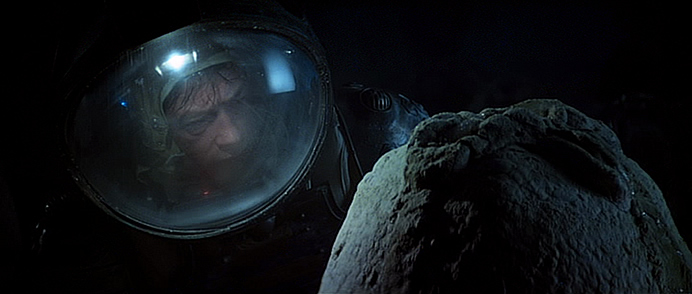
ALIEN, in its way, is the most perfect of all those movies with how it melds the two – huge sets and simple but effective dialogue, big ideas with the most intimate character building, and intelligent themes with a thrill-ride finish. ALIEN wasn’t the last film in the 1970s, but thematically, the argument could be made that it closed out the decade perfectly. ALIEN on its surface may seem to be just another horror film – it’s inspired from movies like IT! THE TERROR FROM BEYOND SPACE! and the original THING – but Ridley Scott, along with the writers, the artists, and the producers who made it work, elevate the material to greatness.
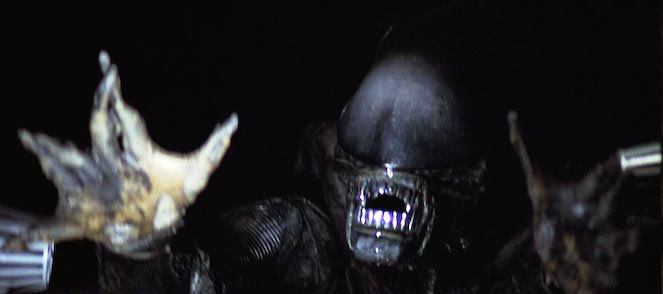
So what makes ALIEN work so well, even all these years later? It could be boiled down to one thing – passion. Nothing in ALIEN is half-assed. H. R. Giger’s creature and set design is unparalleled even today, and Giger even got his own hands dirty helping to build the many designs he created. Ron Cobb’s beautiful work on the Nostromo is still practically an industry standard – the man knows how to build science fiction spaceships (although he was also inspired by the work of Chris Foss), and with the help of Roger Christian, the art director, Ridley Scott’s vision of a “used future” was fully realized. Dan O’Bannon and Ronald Shusett’s script may seem on the surface to be boiler-plate stuff, but they always had a passion for great artists and their work, and they helped to bring these great artists together to make ALIEN into the movie it became.
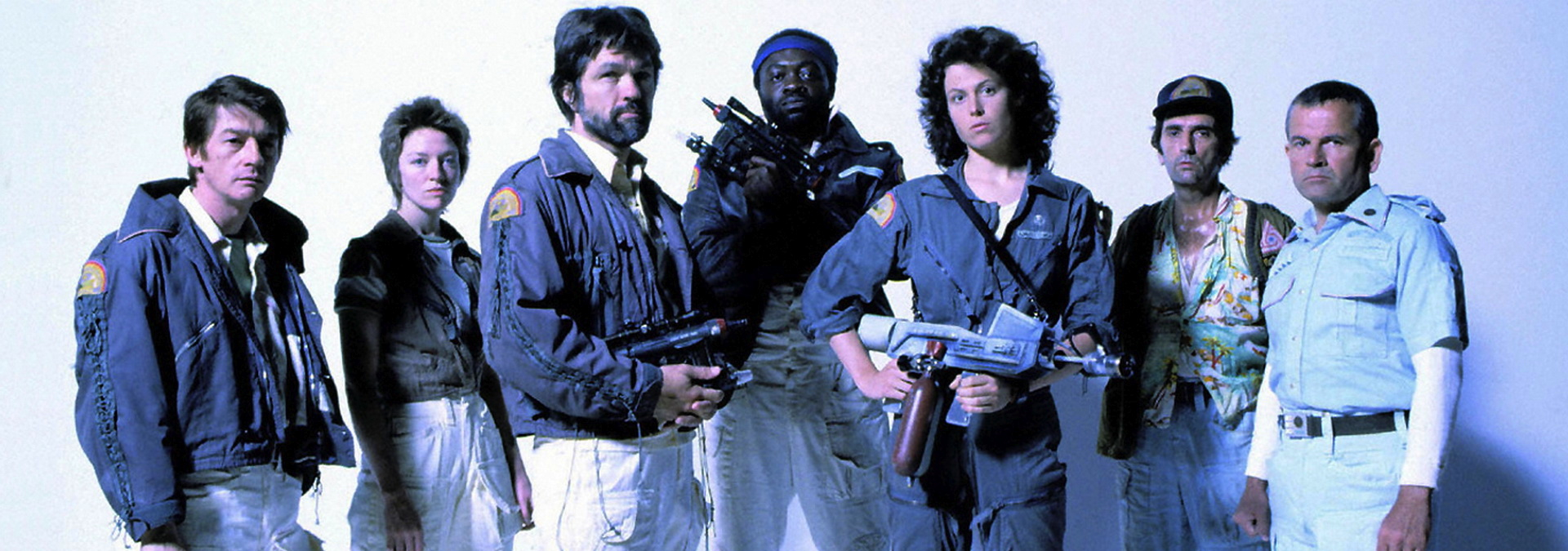
ALIEN feels real because of the “used future” aspects of its art design, and for the characters, which aren’t scientists or government officials for the most part, but just regular people. I remember my father particularly embracing ALIEN for this aspect alone – so much of science fiction, up until STAR WARS, felt cold and antiseptic, but in ALIEN we get regular Joes who drink coffee and aren’t complicated people – they’re just there to do a job and go home. The characters’ relationships with each other are just like all the other guys at the office – they’re friendly to each other, but they aren’t there to make friends, they’re there to haul their rig. These “space truckers” give ALIEN that genuine weight of reality. These guys are us.
I love how much of the dialogue overlaps in the opening scene. One of the primary influences, for me, to ALIEN seems to be Robert Altman – how each of these characters feels organic and real. Scott gave each of these seven crewmembers a backstory but they strictly don’t address it in the movie, and as a result these characters don’t feel like writer constructs but real people. Each of these actors brings something special to their role – the way Ian Holm's Ash moves with purpose, even doing a strange jog-in-place as if to loosen some servos and motors, or the way Harry Dean Stanton's Brett casually rolls a joint. I love how John Hurt's Kane is so eager to go explore some remote corner of the galaxy – you get the feeling that he’s the lone idealist of the crew, which makes what happens to him all the more tragic. Even Dallas’s determination to go into the vent speaks of his guilt – he is the one who insisted that Kane come back aboard, after all, and just the resigned way he tells Ripley that he’s going in instead of her speaks volumes of his own culpability.

Ash is a fascinating character - is he motivated by his programming, by the Company, or is there something more sinister at work? Ian Holm plays Ash not as a cold, emotionless robot, but something worse - someone trying, and failing, at human emotion and empathy. "I can't lie to you about your chances, but... you have my sympathies." Ash isn't just following orders to bring the alien home - he seems to be reveling in this creature's destruction of its crew. "I admire its purity... a survivor, unclouded by conscience, remorse, or delusions of morality." Is this something that Ash aspires to, or something that he sees in humanity that he considers weak? Holm plays Ash brilliantly, becoming the face of a very faceless Company, and in that face we see... nothing but disdain for the crew of the Nostromo.
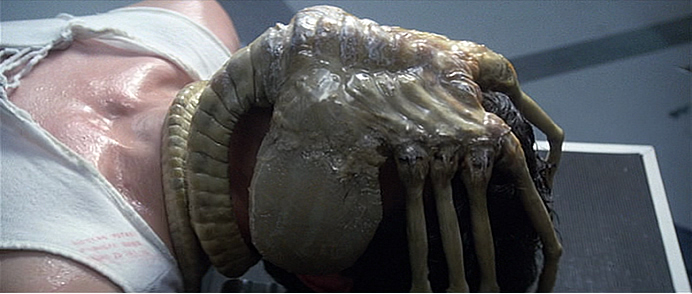
Yaphet Kotto’s Parker was always an interesting character for me – he’s not a hero, he just finds himself put in that position because of the film’s events. But this thing killed his best friend, and his captain, and he’ll go face-to-face with it if he has to. In the beginning, Parker is griping about his pay, and that he want to “go home and party” and by the end he risks (and loses) his life trying to save another crewmember from the alien. If any of the characters is said to have an arc, it could be Parker’s, and Yaphet Kotto plays him with fierce determination and self-effacing humor. Sadly, Veronica Cartwright’s character is probably the weakest of the bunch – Ridley seems to just have her react to things (although Cartwright gets the most memorable blood-splatter of many a horror movie). Of all the characters in ALIEN, she is mere fodder, but she also could be said to be the audience surrogate in the film. But mostly, she’s just there to scream.
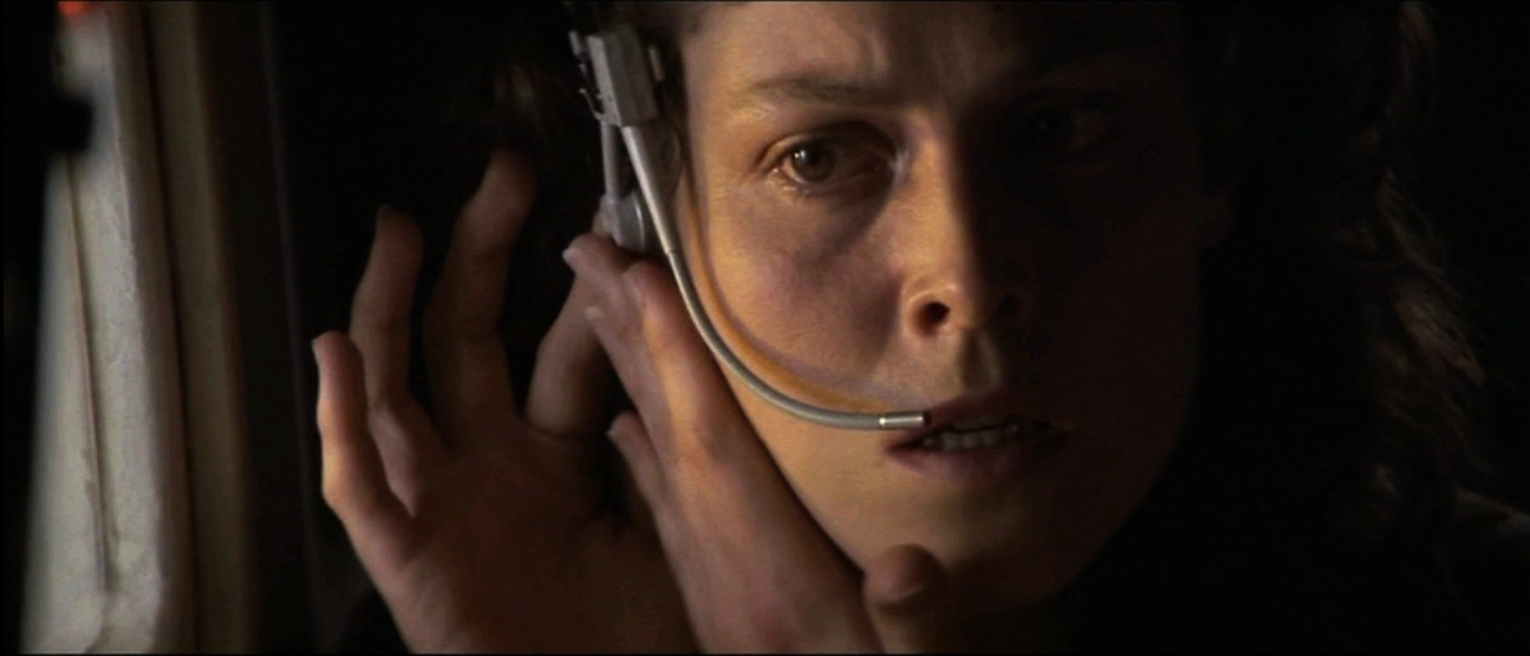
Then, of course, is Ripley, played by Sigourney Weaver in her first major film role, and she carries herself believably and well. She is forced into a position that she is unfamiliar with – Dallas and Kane are the superior officers, and she’s just third string, but she steps up when she has to. She’s also the only one thinking clearly enough to not have Kane aboard her ship once he’s face-hugged – Ash, operating on higher Company orders, countermands her and brings him aboard.
If there’s one complaint about Sigourney’s performance, it comes from a script issue – looking for that damn cat when bad things start to go down. It’s a common complaint among fans and critics that Ripley goes off looking for Jones while a monstrous alien is on board, threatening to jump out at any moment. Certainly, it seems an inconvenient time to go looking for him, but I do think that it gives the audience something to empathize with in regards to Ripley – she’s no emotionless machine, unlike Ash, and she’s not a complete pragmatist, either. It’s a crack in the façade as she decides to look for the unofficial 8th crewmember, and I think it makes her a richer character emotionally. That said, even Ripley knows when to drop the cat and run when she sees the alien blocking her way into the shuttlecraft.
Weaver, of course, goes on to play Ripley in three other ALIEN films, and each time brings a different aspect to the character that we haven’t seen before. But in ALIEN, she’s our first look at the character and she shows even then an inner strength and bravery that makes her character so iconic. And she isn’t doing it to save the world, but the lives of her crew and for herself. She’s not super-Ripley like she was in ALIENS, and she’s also at her most exposed. I love how Weaver sings “Lucky Star” (the SINGIN’ IN THE RAIN version, and not Madonna’s song) as she preps the shuttle to jettison the alien. She does it to calm her nerves, but the more she sings, the more her fear grows, and the melody becomes disjointed. It’s a moment of vulnerability with Ripley that probably makes that character even richer in ALIEN than in the other movies.
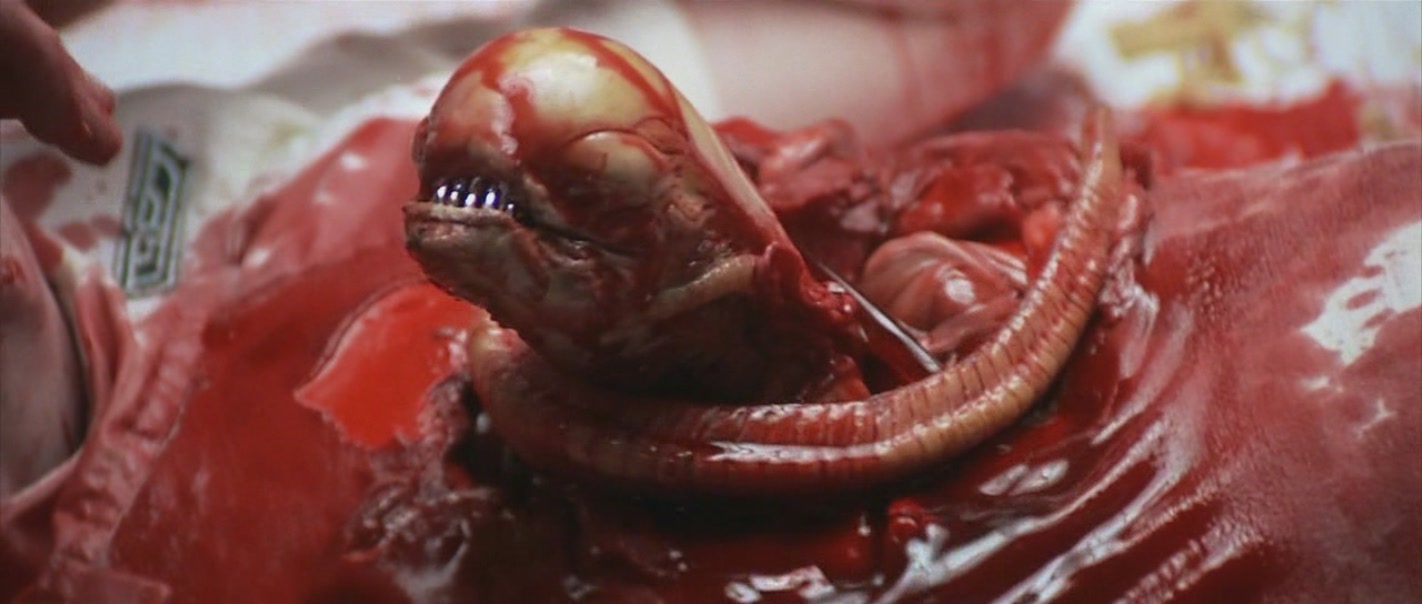
Then there is the famous chestburster scene, the scene that sent many audience members reeling and running out of the theater, which seems almost tame by today’s standards, but only if you look at it outside of the movie. In the movie, it still remains terrifying – Kane, so far in the movie (although we haven’t spent a whole lot of time with him awake) is a perfectly likable fellow, a man who still thinks of space as this wonderful place to explore and still hasn’t seen the nastier side of things. And then, he gives birth, and while much of it is done with the magic of film editing, it’s the gaps that we fill in our minds that make this sequence even more terrifying. At the time critics decried ALIEN’s use of “gratuitous” gore, but this scene is absolutely essential to the movie. My favorite story on the ALIEN Anthology box set is about a theater owner telling Ridley Scott how ALIEN used to mess up his bathrooms something fierce until he went to the projectionist’s booth and edited the chestbursting scene right out. Just imagining the horrified look on Ridley Scott’s face makes me smile – he must have laid into that theater owner tremendously.
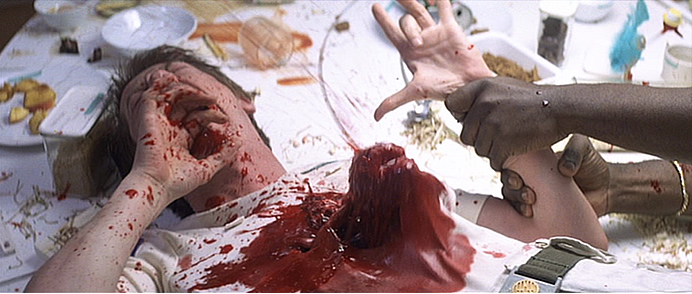
There’s so much more to be said – Jerry Goldsmith’s score, for example, which is both rich and yet still terrifying, hinting at the infinite possibilities of this very dangerous universe, and yet keeping a true sense of adventure and even whimsy at times. Even the marketing campaign is brilliant, suggesting far more than showing, and that iconic poster is still one of the best movie posters ever. Even the tag line, “In space, no one can hear you scream” evokes wonder and throws down a challenge to those brave enough to see the movie.
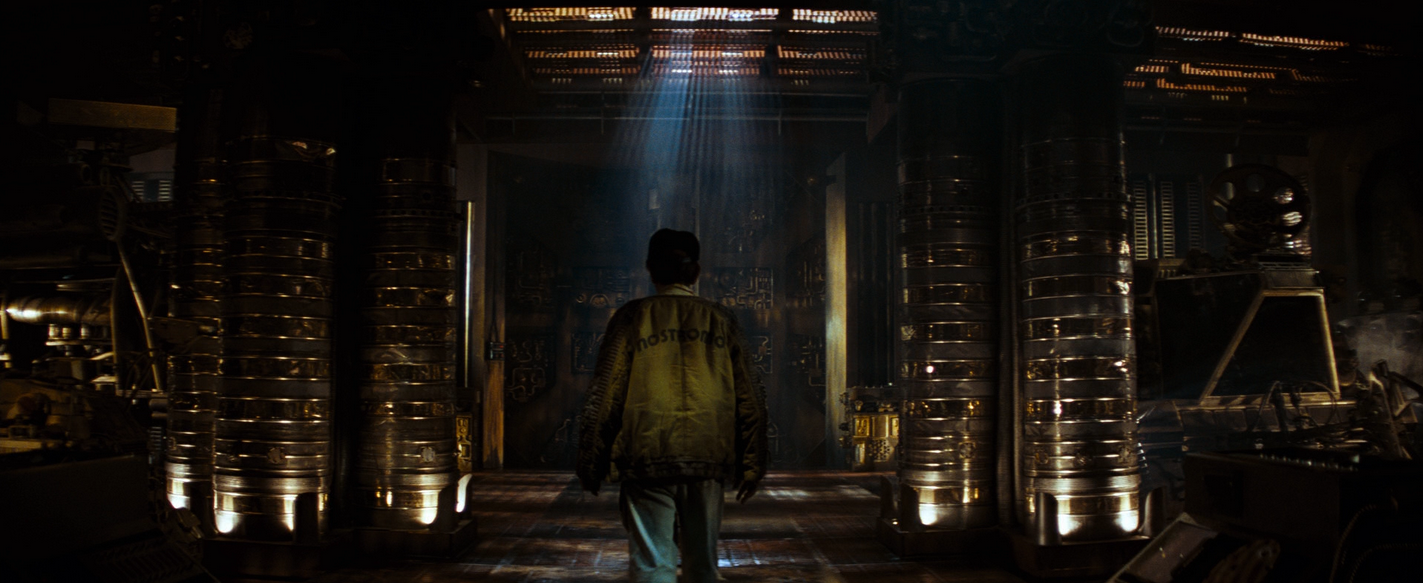
What has always terrified me about ALIEN isn’t just the alien itself, although that is still frightening even all these years later. No, ALIEN is the antithesis of movies like STAR WARS or CLOSE ENCOUNTERS or even 2001: A SPACE ODYSSEY. There is nothing friendly out there. In fact, the universe moves on its own, indifferent to humanity in any way, shape or form. We are simply meat, or worse, eggs. Even the Space Jockey suggests something greater than humanity – the ship itself doesn’t look like anything human could have designed it; all curves and no right angles, and PROMETHEUS notwithstanding, the Jockey looks decidedly alien.
The alien, as envisioned by O’Bannon, Shusett, and Giger, is truly a “perfect organism”. Even looking at it full-on in the light of day, the alien seems… wrong. It’s no accident that the work of H. P. Lovecraft is hugely influential to the feel of ALIEN, especially since one of Giger’s most well-known art books is called NECRONOMICON. But even with Ash’s statement, the alien feels different in this film as opposed to all the others. In ALIEN, it really does seem unstoppable, and if there’s any misgiving I have for ALIENS it’s that that movie makes this inspired creation a little less foreboding. Looking at ALIEN now, and taking the films afterwards into account, there’s nothing about the alien that a pulse rifle can’t cure in a second or two, and that takes away some of the more scary aspects of the creature. That’s not disparaging ALIENS in any way, and it’s just the law of horror movies in effect – the more of the monster we see, the less frightening it becomes.
So it’s to Ridley Scott’s immense credit (and that of the editors, Terry Rawlings and Peter Weatherley) that in ALIEN we barely see it at all, except in very fleeting edits. Instead, our minds fill the spaces that the movie refuses to fill, and the alien becomes that much more horrifying in retrospect. It’s almost as if the movie camera itself is too frightened to look directly at it. Derek Vanlint’s stunning cinematography (sadly, he passed away in 2010) gives ALIEN the scope and grandeur that makes the film’s universe that much more real and solid.
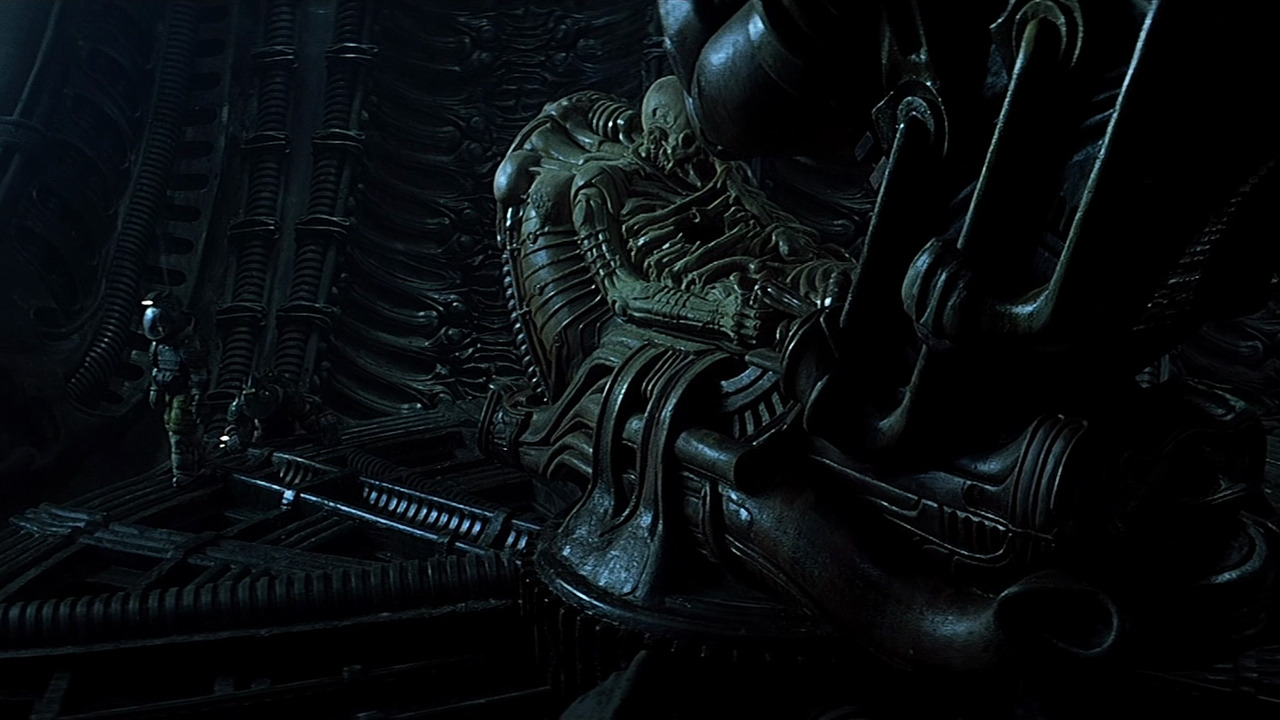
Of course, Ridley Scott revisited this universe in PROMETHEUS, but while I had issues with that movie, I welcomed Scott’s return to it. That said, ALIEN is just flat-out a better movie – unlike PROMETHEUS, which admittedly has a larger story to tell, ALIEN’s simplicity remains its strongest facet. This is a movie geared to entertain and perhaps frighten, and larger questions about the universe and humanity and even corporate malfeasance remain strictly in the background. That gives those ideas a much bigger stage, oddly enough – because they aren’t specifically addressed, that gives them room to play in the mind of the audience. ALIEN also has the distinct advantage of having more of a clarity of purpose than PROMETHEUS; no matter how much we may want to stop and admire the flowers on the side of the road, we still have to keep moving. Even if you don’t buy into Ridley Scott’s philosophy about who and what the Space Jockey is, it doesn’t really matter to ALIEN as a movie. It still works remarkably well, and if you don’t want to carry the ideas of PROMETHEUS over to this movie, you don’t have to.
In fact, ALIEN works better if you don’t. It’s still a very scary movie, even after all these years have passed and filmmakers young and old have strip-mined it of its ideas and its scare tactics. It sounds reductive to call it a “haunted house in space” movie, but it’s exactly what it is and all those ideas thrown around just give the movie a more solid footing in reality. ALIEN feels like it could happen – our future and ALIEN’s depiction of it still feel somewhat plausible. In a universe where a Company sends its blue-collar workers to die in some back-alley world just to get a bioweapon, it feels very plausible.
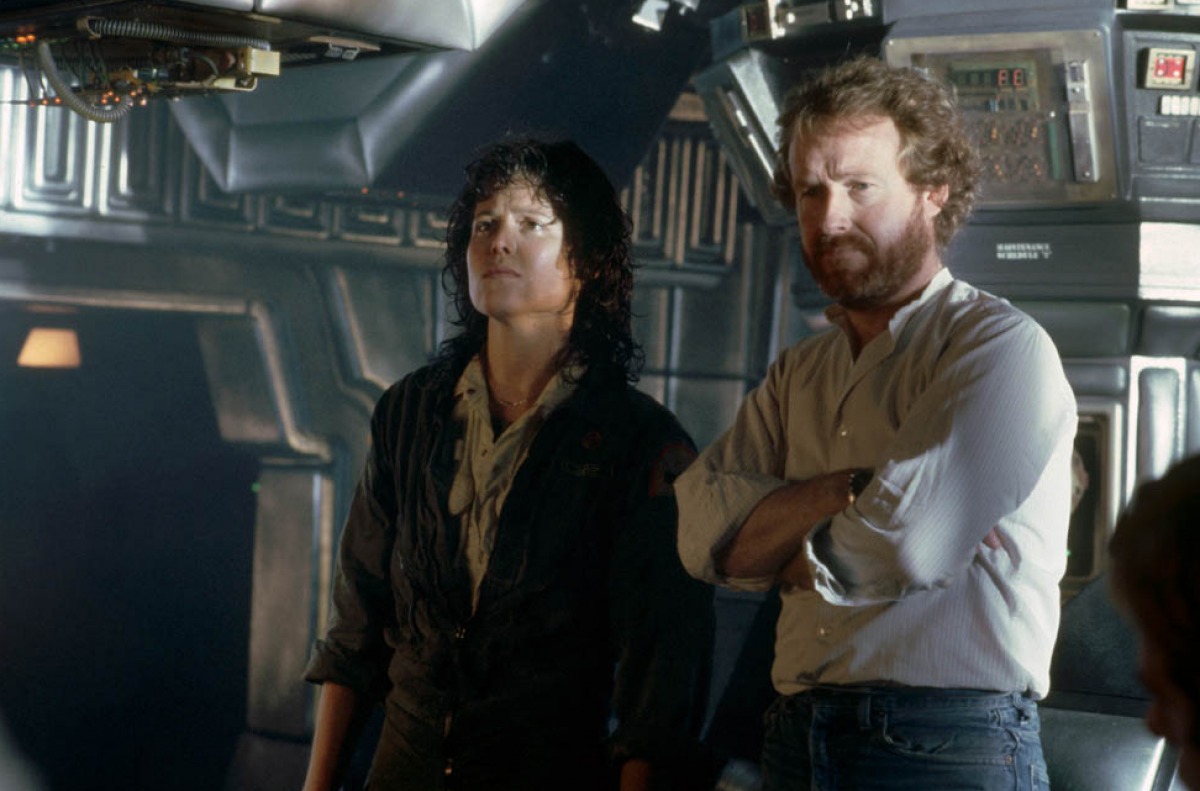
ALIEN is my favorite of the series – unlike the other films, which inevitably shrink that universe down a little bit each time, ALIEN feels mythic. It’s a simple story, but Ridley Scott, Dan O’Bannon, Ronald Shusett, H. R. Giger, the many artists and set designers, the wonderful score by Jerry Goldsmith – they all bring their considerable talents to the story and the result feels far bigger than what it appears to be on paper. Like STAR WARS or 2001: A SPACE ODYSSEY before it, ALIEN shows us just enough to intrigue us and get us asking questions, and as the best storytellers know, it’s the questions that often have more value than their answers.
I prefer the theatrical release to the director’s cut (I don’t have much use for the added scenes, and I think the Dallas scene towards the end is a bit perfunctory) because the theatrical eases us out of our defenses before it decides to stick in the knife, and even though it’s a little slow the tension increases to the point that the movie feels like the old story about putting a frog in slowly heated water – by the time it’s brought to a boil, we’re past the point that we can do anything about it. ALIEN still has an undeniable power, 33 years later, and remains just as terrifying and relevant.
Nordling, out. Follow me on Twitter!
Nordling Dissects ALIEN: RESURRECTION!
